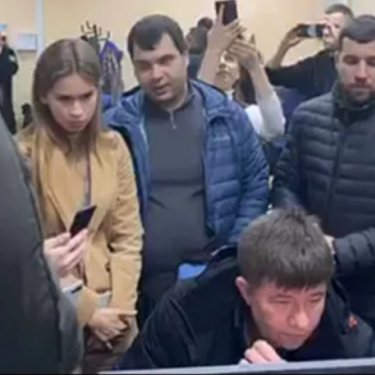RSF decries Ukrainian security raids on TV channel, reporters

Reporters Without Borders (RSF) condemns last week’s searches of the homes of three
Ukrainian journalists and the Kiev-based commercial TV channel 1+1 in response to the
leak of an audio recording of the prime minister that led him to offer his resignation – an
offer eventually rejected by the president. Journalists’ sources must be protected, RSF said.
The Security Service of Ukraine (SBU) has been targeting 1+1’s investigative journalism programme “Sekretni Materialy” (Secret Documents) ever since it broadcast the recording, which shook the Ukrainian political landscape.
On 5 February, the SBU searched 1+1’s headquarters, the homes of Denis Danko and Yevhen Kuksin, who are members of the TV channel’s journalistic investigations unit, and the home of Oleksandr Nizovtsev, a journalist who used to work for 1+1. The SBU claimed to be looking for illegally obtained material although the three journalists insist they obtained the leaked recording legally.
“These searches violated the confidentiality of journalists’ sources because the seized computer material contained potentially sensitive data,” said Jeanne Cavelier, the head of RSF’s Eastern Europe and Central Asia desk. “Police and judicial access to journalistic sources must be limited to extremely exceptional circumstances that are strictly determined by the law. We are alarmed by the repeated attempts to violate the confidentiality of sources in Ukraine, including the harassment of journalists working for the Radio Free Europe programme “Skhemy” in October 2019.”
Prime Minister Oleksi Honcharuk offered to resign on 15 January following publication of the audio recording made without his knowledge, in which he is heard questioning President Volodymyr Zelensky’s competence in economic matters during a private meeting with the head of the national bank.
The president refused to accept his resignation and ordered the police to find out who made the recording. During a meeting attended by the head of 1+1 on 6 February, he said he had proof that the journalists had played a direct role.
1+1 , which is owned by the oligarch Ihor Kolomoisky, published an open letter to President Zelensky on 6 February accusing the authorities of violating the freedom of expression that is guaranteed by article 34 of Ukraine’s constitution, and of an “attempt to put political pressure on an independent media outlet.”
The parliamentary committees on freedom of expression and on humanitarian and information issues held special meetings the same day and condemned the “obstruction of the work of journalists.” Two Ukrainian NGOs, the Institute of Mass Information (IMI) and DetektorMedia, issued a statement reminding the security services and journalists of the need to respect the law.
1+1 has also said it plans to file a complaint against the SBU for several violations of legal procedure during the searches. The searches should have been limited to the offices of the journalists named in the judicial investigation but were also carried out in other areas of the TV channel.
Two computers were seized in violation of article 168 of the criminal procedure code, which allows the police to copy data files but not seize equipment. In the search of Danko’s home, the SBU seized a tablet computer, three USB sticks and wedding photos, and no warrant was provided during the raid on Kuksin’s home. The SBU responded to the criticism by flatly denying any procedural violations and claiming that that these three journalists were not the only targets of the investigation.
Ukraine is ranked 102nd out of 180 countries in RSF’s 2019 World Press Freedom Index.



